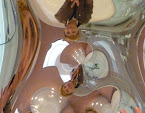I am reading Loiterature, happily not an obsessively-linear book, by the only Australian member of OuLiPo, Ross Chambers, who is currently the Marvin Felheim Distinguished University Professor of French and Comparative Literature at the University of Michigan and is a Visiting Professor at Louisiana State University.

The cover image of ‘Loiterature’ is a detail from a photograph by Montague Glover
 Montague Glover’s photograph
Montague Glover’s photographLoiterature's Chapter I Divided Attentions (On Being Dilatory) begins:
I’ve been giving up caffeine for years now, but a caffé latte steams at my elbow. Midsummer:
Wet heat drifts through the afternoon
like a campus dog, a fraternity ghost
waiting to stay home from football games
The arches are empty clear to the sky
These verses might have been written (or composed, or generated) only a few yards from where I sit, at the intersection of N. University and S. State in Ann Arbor, the suture point (in my personal myth of the city) where the campus meets the town. No campus dogs in evidence (expensive animals on leashes don’t qualify). Times change. When Frank O’Hara came to Ann Arbor in 1950 he was amused by the Midwestern candor of the cafeteria signs that read, bluntly, FOOD; today they’re more likely to read cappuccino, and it’s hard to find a cafeteria:
(la forme d’une ville
Change plus vite, hélas! que le coeur d’un mortel).
Sitting lazily at this much frequented intersection, I think about intersections and I think about belatedness, my regret for an Ann Arbor I never knew (and wouldn’t have liked), the stab of Baudelaire’s midline exclamation point at “hélas!”, the image of abstention - better still, of anticipated abstention - in “waiting to stay home from football games.” Being belated, one foot in 1950, the other in the 1990s, is (like abstaining and anticipating) a form of divided attention, the “distracted” attention Benjamin thought characteristic of modernity (was it Benjamin? I must remember to look it up). One foot in campus, one in town; one in 1950, one in 1994.....
Loiterature's back cover notes give a pretty good summary of the contents :
The fabric of the western literary tradition is not always predictable. In one wayward strand, waywardness itself is at work, delay becomes almost predictable, triviality is auspicious, and failure is cheerfully admired. This is loiterature. Loiterature is the first book to identify this strand, to follow its path through major works and genres, and to evaluate its literary significance.
By offering subtle resistance to the laws of "good social order," loiterly literature blurs the distinctions between innocent pleasure and harmless relaxation on the one hand, and not-so-innocent intent on the other. The result is covert social criticism that casts doubt on the values good citizens hold dear—values like discipline, organization, productivity, and, above all, work. It levels this criticism, however, under the guise of innocent wit or harmless entertainment. Loiterature distracts attention the way a street conjurer diverts us with his sleight of hand.If the pleasurable has critical potential, may not one of the functions of the critical be to produce pleasure? The ability to digress, Ross Chambers suggests, is at the heart of both, and loiterature’s digressive waywardness offers something to ponder for critics of culture as well as lovers of literature.
Read Laurence Porter’s review and a ‘preview’ of the book here
Books by Ross Chambers include The Writing of Melancholy, Facing It : AIDS Diaries and the Death of the Author, and Room for Maneuver.

No comments:
Post a Comment